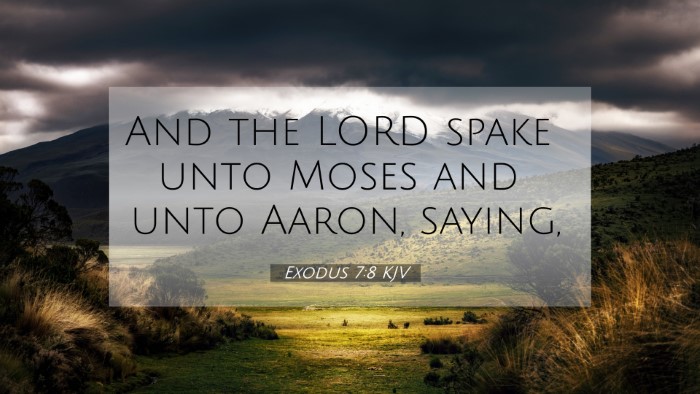Understanding Exodus 7:8: A Combined Commentary
Verse Context: Exodus 7:8 states: "And the Lord spake unto Moses and unto Aaron, saying," which introduces a critical moment in the narrative of the Exodus story.
Overview of Meaning: This verse marks a pivotal transition where God begins to actively guide and instruct Moses and Aaron in their mission to confront Pharaoh and lead the Israelites out of Egypt. It signifies divine communication and authority.
Insights from Public Domain Commentaries
-
Matthew Henry:
Henry emphasizes the significance of God's direct communication with Moses and Aaron. He notes that this interaction demonstrates God’s readiness to support His chosen leaders and the importance of their obedience and readiness to act upon divine instructions.
-
Albert Barnes:
Barnes interprets the verse as a crucial beginning of a series of interactions between God and His servants, signifying the need for divine guidance in fulfilling the mission of delivering Israel. He highlights that this verse sets the stage for the subsequent plagues, which serve as manifestations of God’s power over Egypt.
-
Adam Clarke:
Clarke elaborates on the role of communication between God and His leaders. He points out that such divine revelation not only empowers Moses and Aaron but also serves as a reminder of God's ongoing relationship with His people, affirming their collective identity and purpose in the world.
Cross-Referencing Biblical Texts
This verse can be explored and understood more deeply through several other biblical references that elucidate its themes:
- Exodus 3:10: God calls Moses to lead the Israelites out of Egypt, establishing the context of divine purpose.
- Exodus 4:15-16: God empowers Moses and Aaron to speak on His behalf, emphasizing the importance of their partnership in God's plan.
- Exodus 6:6-8: God's promise of deliverance highlights His faithfulness and the fulfillment of His covenant with Israel.
- Jeremiah 1:7-9: Similar to Moses’ calling, God prepares and equips His prophets for the tasks ahead.
- Acts 7:35-36: Stephen references Moses as a leader sent by God, showcasing the continuity of divine leadership throughout Scripture.
- Romans 10:14: The necessity of preaching and proclaiming God's message emphasizes the importance of divine communication.
- Matthew 28:19-20: The Great Commission aligns with the theme of God sending leaders to fulfill His mission on Earth.
Thematic Connections in Scripture
This verse not only serves as a standalone instance of God’s communication but also relates to broader themes within the scriptures:
- Leadership and Obedience: The roles of Moses and Aaron highlight the themes of submission to God's will and the divine authority in leadership.
- Divine Instruction: This encounter symbolizes the importance of seeking and adhering to God's guidance in leadership roles.
- Covenant Fulfillment: The interaction underlines God's commitment to His covenant with the Israelites, showcasing the theme of redemptive history throughout the Bible.
Importance of Cross-Referencing
Understanding the connections between Bible verses, such as Exodus 7:8, enhances our ability to grasp the Scripture’s overall narrative. Here are some tools and methods to explore these connections:
- Bible Concordance: Use a comprehensive concordance to locate and cross-reference various biblical texts.
- Bible Cross-Reference Guide: Employ guides that categorize verses thematically for easier study.
- Cross-Reference Bible Study: Join or create study groups that emphasize inter-Biblical dialogue and thematic exploration.
Conclusion:
The verse Exodus 7:8 is foundational in understanding God's interaction with His chosen leaders and lays groundwork for the ensuing narrative of liberation for the Israelites. By utilizing tools for Bible cross-referencing, one can gain a deeper understanding of this text’s implications and significance in the broader biblical context.
Keywords: Bible verse cross-references, connections between Bible verses, linking Bible scriptures, comparative Bible verse analysis, Bible verses that relate to each other, cross-referencing Biblical texts, thematic Bible verse connections, Bible verse parallels, scriptural cross-referencing, inter-Biblical dialogue.


